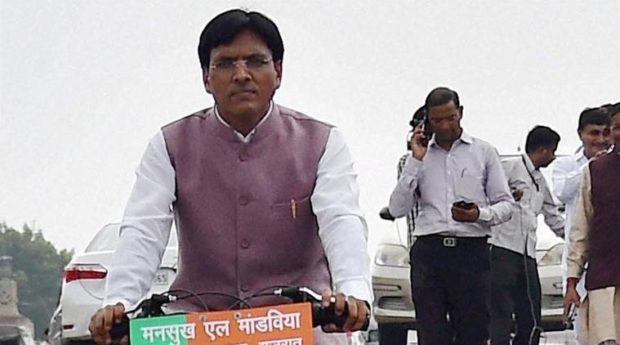
Priority in chartering to be given to vessels built, flagged in India and owned by Indians:Govt
Team Udayavani, Oct 22, 2020, 3:40 PM IST

New Delhi: In a major boost to shipbuilding in India, the government has amended existing norms and now the first priority in chartering of vessels will be given to ships built and flagged in India as well as owned by Indians, Union Minister Mansukh Mandaviya said on Thursday.
The move in alignment with the Aatmanirbhar Bharat mission will promote ”Make in India” initiatives and give a strategic boost to domestic shipbuilding industries and generate employment, the minister said.
“To boost shipbuilding activities in India, the Ministry of Shipping has amended Right of First Refusal (ROFR) licensing conditions. Now, it has been decided that for any kind of charter of a vessel undertaken through a tender process, the first priority for RoFR would be given to Indian built, Indian flagged and Indian owned vessels,” Shipping Minister Mandaviya told PTI.
The second priority will be given to foreign-built, Indian flagged and Indian-owned vessels while the third priority will be given to Indian built, foreign-flagged and foreign-owned ships, he said and termed the policy change a “bold step” in line with Prime Minister Narendra Modi’s vision to promote the domestic industry.
The Ministry of Shipping has reviewed the ROFR licensing conditions for chartering of vessels/ships through tender process for all types of requirements in pursuance of ”Make in India” policy of the government.
“The revision of RoFR licensing conditions is a giant step towards Aatmanirbhar Shipping. It will promote ”Make in India” initiatives through self-reliance and will give a strategic boost to domestic shipbuilding industries, contributing towards long-term economic growth of India,” Mandaviya said.
“India mostly handles four types of EXIM cargo – crude, gas, coal and fertiliser. Government of India floats tenders for bringing these from foreign. So far Indian flags were given priority in tender irrespective of where the ship is built. Now we have changed that in addition to Indian flag it should be ”made in India”. Government PSUs used to give priority to Indian flags till now but now Indian make has also been included,” Mandaviya said.
He elaborated that if any international vessel emerges the lowest bidder in any tender, ”Indian built, Indian flagged and Indian owned vessels” would be first offered the chance to match that bid irrespective of the fact that they had bid higher amount and if they are ready, tender would be given to them first. Only after their refusal, the bid will go to any other vessel, he added.
To promote the demand of the ships built in India, priority in chartering of vessels is given to vessels built in India, flagged in India and owned by Indians under the amendments in the guidelines of the ROFR.
The minister said the idea was to enhance India”s share in global shipbuilding from barely one per cent at present to 3 per cent in the next five years.
“There are 24 shipyards and shipbuilding activities are bound to boost post this step and in turn would result in employment of a large number of labourers, technicians, engineers and other skilled personnel,” he said.
All vessels flying the flag of India (i.e. registered in India) up to the date of issue of new circular by the Director-General of Shipping shall be deemed to be Indian built vessels, the Ministry of Shipping said.
Besides, it said the foreign-flagged vessels permitted by DG (Shipping) for chartering by an Indian citizen/company/society, who is building a ship in an Indian shipyard for registration under the Indian flag, as a temporary substitute for the Indian ship under construction, shall come under first priority provided “25 per cent of the contract money has been paid to the Indian shipyard” and “50 per cent of the hull fabrication has been completed, as certified by recognised organisation.”
The duration of licence to such chartered vessel shall be limited to the period of building of the ship, as mentioned in the shipbuilding contract.
It is to be noted that the Ministry of Shipping has made provision for long-term subsidy for shipbuilding activities under shipbuilding financial assistance policy (2016-2026).
The ministry has already disbursed an amount of Rs 61.05 crore till date under this policy.
It is an endeavour of the government to further incentivise shipbuilding by providing additional market access and business support to ships built in India, Mandaviya said.
He said the revised guidelines will give a boost to the domestic shipbuilding and shipping industries and encourage the domestic shipping industry to support the domestic shipping industry.
The minister said to revive the Indian shipbuilding industry, the government has already asked all major ports to procure or charter tug boats that are made in India.
India has 12 major ports — Kandla, Mumbai, JNPT, Mormugao, New Mangalore, Cochin, Chennai, Kamarajar (Ennore), VO Chidambaranar, Visakhapatnam, Paradip and Kolkata (including Haldia) — that handle about 61 per cent of the country’s total cargo traffic.
Udayavani is now on Telegram. Click here to join our channel and stay updated with the latest news.
Top News

Related Articles More

Notorious gangster wanted in UAPA case arrested at Nepal border

‘Condition critical’, say doctors as farmer leader Dallewal’s fast enters 27th day

ISRO to study how crops grow in space on PSLV-C60 mission

Vandalism at Allu Arjun’s residence in Hyderabad

PM Modi to attend Christmas celebrations hosted by Catholic Bishops’ Conference of India
MUST WATCH
Latest Additions

Kannada Sahitya Sammelana: Food distribution creates stir

Rohit gets hit in nets, practice pitches on slower side

India & Kuwait elevate ties to strategic level; ink defence pact after PM Modi meets top Kuwaiti leaders

In Kuwait, PM Modi meets yoga practitioner, other influencers from Gulf country

Notorious gangster wanted in UAPA case arrested at Nepal border
Thanks for visiting Udayavani
You seem to have an Ad Blocker on.
To continue reading, please turn it off or whitelist Udayavani.
















